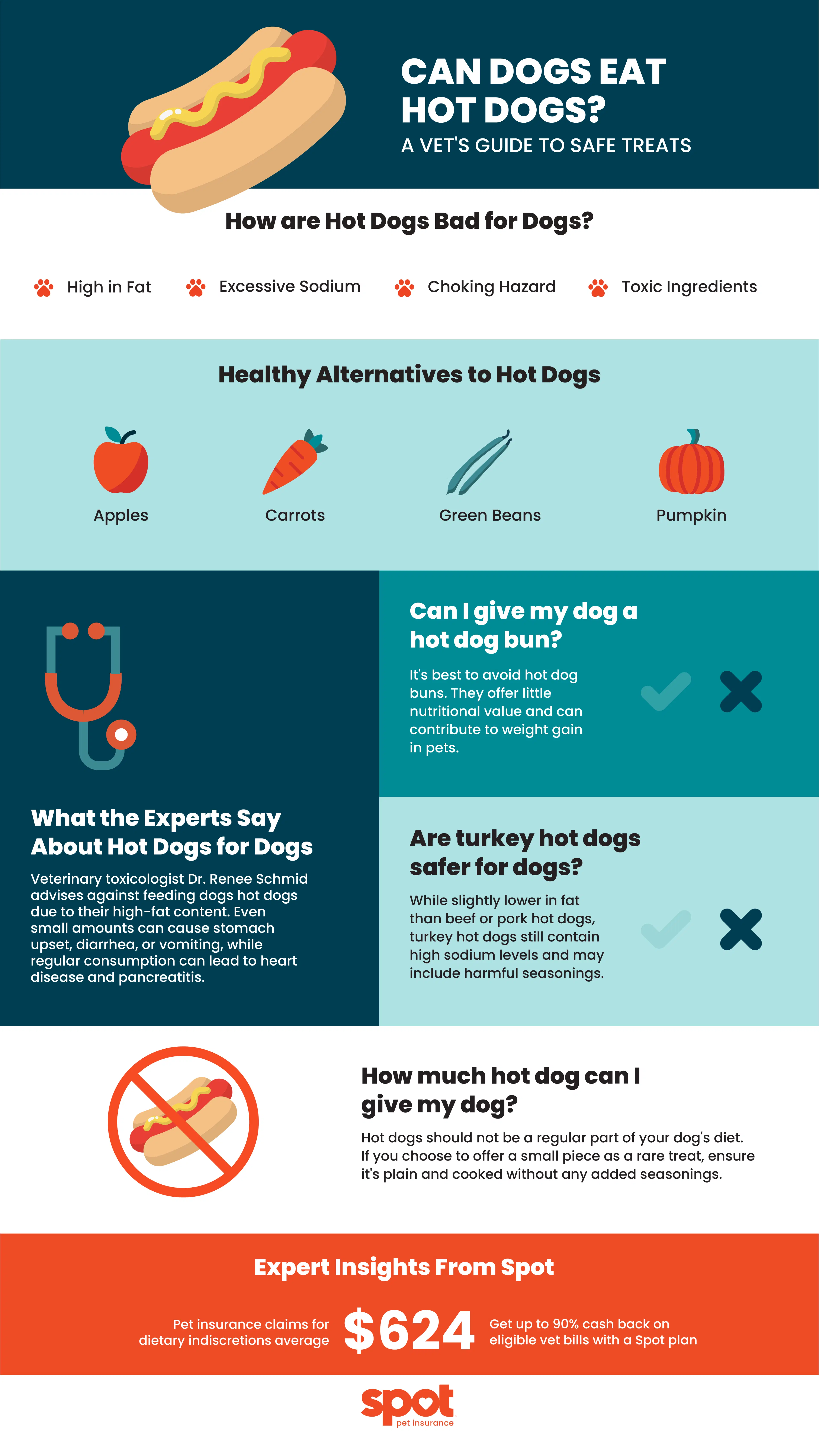Hot dogs, a classic American favorite, often tempt our furry companions with their savory smell. But are hot dogs safe for dogs? While technically dogs can eat hot dogs, it's crucial to understand the risks involved and consider healthier alternatives for your four-legged friend.
Are Hot Dogs Bad for Dogs?
The answer is not a simple yes or no. While hot dogs aren't toxic to dogs, they're far from a healthy treat. Here's why:
High in Fat: Hot dogs are loaded with saturated fat, which can contribute to obesity, pancreatitis, and other health problems in dogs. This is particularly risky for smaller breeds and those prone to digestive issues.
Excessive Sodium: The high sodium content in hot dogs can strain a dog's kidneys, raise blood pressure, and lead to dehydration in dogs.
Choking Hazard: Hot dogs, especially when consumed whole, can easily become a choking hazard.
Toxic Ingredients: Some hot dogs contain garlic and onions, which are toxic to dogs1 and can cause serious health problems like anemia. Even small amounts of these ingredients can be dangerous.
What the Experts Say About Hot Dogs for Dogs
Veterinary toxicologist Dr. Renee Schmid advises against feeding dogs hot dogs due to their high-fat content. Even small amounts can cause stomach upset, diarrhea, or vomiting, while regular consumption can lead to heart disease and pancreatitis.
Expert Insights From Spot
As much as we love to share our favorite foods with our pets, it's important to remember that human food can often upset a dog's stomach. Spot's internal data shows that pet insurance claims for dietary indiscretions average $642*, highlighting the importance of caution and research before sharing snacks with your pet.
Healthy Alternatives to Hot Dogs
Instead of hot dogs, opt for these healthier and safer treats for your dog:
Apples: A good source of fiber and vitamin C (remove the core and seeds).
Carrots: Crunchy and low in calories, providing fiber and beta-carotene for eye health.
Green Beans: Low-calorie and nutritious, offering fiber and vitamins.
Pumpkin: High in fiber and can aid digestion.

FAQs About Dogs and Hot Dogs
Can I give my dog a hot dog bun? It's best to avoid hot dog buns. They offer little nutritional value and can contribute to weight gain in pets.
Are turkey hot dogs safer for dogs? While slightly lower in fat than beef or pork hot dogs, turkey hot dogs still contain high sodium levels and may include harmful seasonings. It's best to choose a different treat.
How much hot dog can I give my dog? Hot dogs should not be a regular part of your dog's diet. If you choose to offer a small piece as a rare treat, ensure it's plain and cooked without any added seasonings.
What happens if a dog eats hot dogs? If your dog accidentally eats a small amount of hot dog, they'll likely be fine. Monitor them for any signs of digestive upset like vomiting or diarrhea. If they consume a large amount or show concerning symptoms, contact your veterinarian immediately.
Key Takeaways
While the occasional bite of a plain, cooked hot dog might not harm your dog, it's not the healthiest option. Choose nutritious alternatives that are safer and better for your dog's overall well-being. Remember, a balanced diet and appropriate treats are key to a long and happy life for your furry companion.
If you're concerned about your dog's diet or have any questions about feeding them human food, consult your veterinarian. They can provide personalized advice based on your dog's specific needs and health conditions. Spot Pet Insurance is here to help cover unexpected vet bills, including those related to dietary issues.

With 15 years as a dog and cat parent, my pet articles are a mix of humor and firsthand experience - proof that the best stories often come with paws and purrs.
*Jan 2019 to Aug 2024 Spot Pet Insurance Services, LLC claims data.
Ripley, Katherine. “Can Dogs Eat Hot Dogs? Why Hot Dogs Aren’t Healthy for Dogs.” American Kennel Club, 16 July 2025, www.akc.org/expert-advice/nutrition/can-dogs-eat-hot-dogs/.
Mitchell, Sandra. “Can Dogs Eat Hot Dogs?” PetMD, 01 Aug. 2023, www.petmd.com/dog/nutrition/can-dogs-eat-hot-dogs.
AKC Staff. "Fruits and Vegetables Dogs Can or Can't Eat." American Kennel Club, 15 Oct. 2025, https://www.akc.org/expert-advice/nutrition/fruits-vegetables-dogs-can-and-cant-eat/.
The information presented in this article is for educational and informational purposes only and does not constitute or substitute for the advice of your veterinarian.











